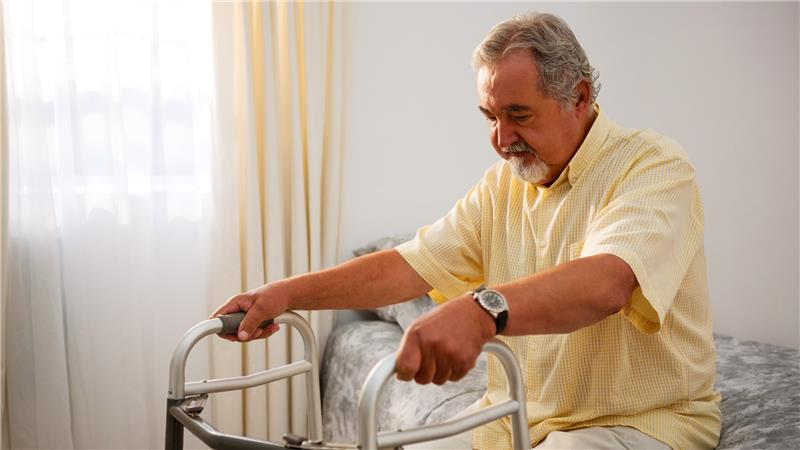Breast Cancer Awareness Month: Applying for disability benefits

Sadly, most of us know someone affected by breast cancer. In Scotland, every year around 4,800 people are diagnosed with breast cancer according to Breast Cancer Now.
Getting a cancer diagnosis is one of the hardest things that anybody can go through. But we know that having cancer also comes with a financial burden, with patients and families facing costs to pay for things like transport, higher energy bills and clothing. People can also experience a loss of income by having to take time off work or give up work completely to care for someone with cancer.
Adult Disability Payment is extra money to help pay for some of these costs and support people with a disability or long-term health condition, such as cancer, that affects their everyday life. We want to make sure that people are aware of the all the benefits that they, and their carers, could be eligible for to help ease some of the financial pressure.
During Breast Cancer Awareness Month, we spoke with Elise, a registered nurse and one of our Senior Health and Social Care Practitioners who supports our team to process disability benefit applications.
Tell us about your role at Social Security Scotland
“I’m a Senior Practitioner within Health and Social Care Operations at Social Security Scotland. I’m also a registered nurse with a background in cancer care.
“I’m responsible for a team of practitioners who provide daily support to our colleagues processing disability benefit applications by providing them with more in-depth knowledge about different illnesses and conditions, including cancer, so that they can make decisions based on how their disability impacts their everyday life.”
What advice would you give to people with breast cancer who are applying for disability benefits and to the people who are helping them?
“We understand that everyone’s experience of breast cancer and its treatment is different, and I would encourage anyone affected by breast cancer to tell us about the ways that breast cancer is affecting them even after initial treatment is finished. This helps us to make a decision on their application that is tailored to their needs.
“In order to make sure that your application for Adult Disability Payment can be processed as quickly as possible, I would advise people to gather supporting information that can be submitted to support their application.
"This helps us to understand someone’s condition or disability and how it affects their day-to-day life. It could be a letter from your breast care nurse, your breast surgeon or oncologist. You may have a copy of your radiotherapy or chemotherapy schedule or a copy of your discharge letter from hospital following breast surgery. This letter often contains information about your cancer and treatment plan. Your GP often has this information too as they are sent information from the hospital cancer teams.
“In addition to the supporting information needed from a professional, you can also provide supporting information from someone in your support network such as a friend or relative. These will be people who know you best and can help us build up a more holistic picture of your day-to-day needs.
“We need supporting information from a professional to broadly confirm someone's condition, disability or needs. It does not have to be a diagnosis.
“We can gather supporting information on a person’s behalf if we are asked to, however, this can take a bit longer, and some people don’t realise they already have the information to hand.”
What about terminal illness?
“Sadly, some people who have breast cancer will receive a terminal diagnosis. At this very difficult time, people can apply for disability benefits under Special Rules for Terminal Illness, which means that we will fast-track their application and make sure payments are made as quickly as possible.
“In support of the application, we require a Benefits Assessment for Special Rules in Scotland (BASRiS) form, completed by the person’s registered doctor or registered nurse.
“The BASRiS form can be submitted to Social Security Scotland by the person applying under special rules or by their registered doctor/nurse. Alternatively, a person can ask us to contact their registered doctor/nurse to ask for a BASRiS form.”
What support is available to people caring for someone who has breast cancer?
“Cancer doesn’t just impact the person getting the diagnosis. It can also impact their friends and family supporting them through their treatment who might also be providing care, such as giving them medication or taking them to appointments.
“If you are caring for someone with breast cancer, you could be eligible for Carer’s Allowance Supplement – this is an automatic payment made twice a year to people who get Carer’s Allowance through the DWP on certain dates each year.
“Sometimes younger people might be providing care for a family member, friend or neighbour with cancer, which can include giving them emotional support or helping them with their mental health. If you are 16, 17 or 18 and caring for people who get a disability benefit for an average of 16 hours a week or more, I would urge you to check if they are eligible for an annual payment of £359.65 via our Young Carer Grant.“
More information
To find out more about these benefits and apply online, over the phone or book an appointment to apply in-person, people can visit mygov.scot/benefits or call us free on 0800 182 2222.
Carer’s Allowance will soon be replaced by Carer Support Payment in Scotland.

